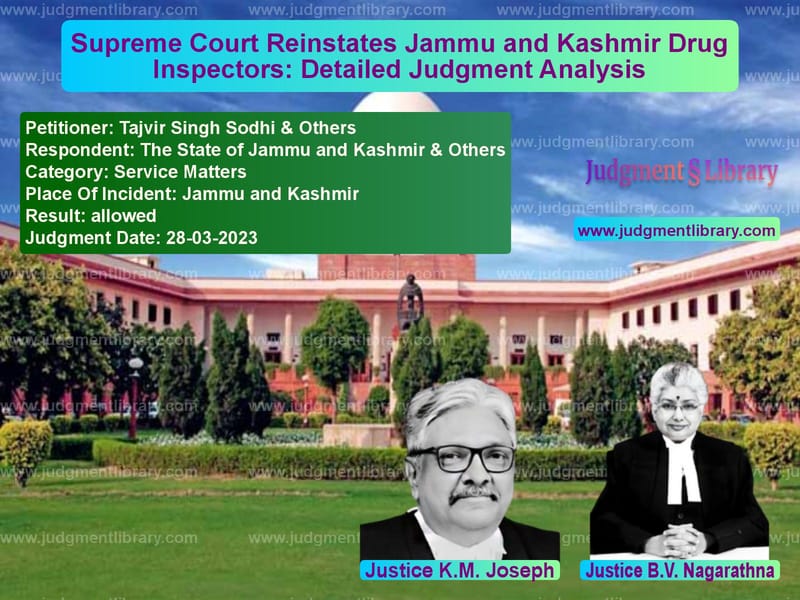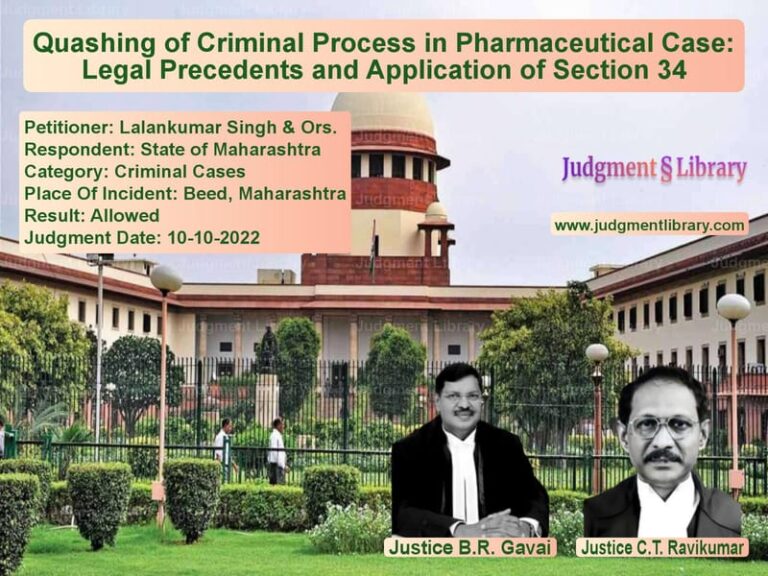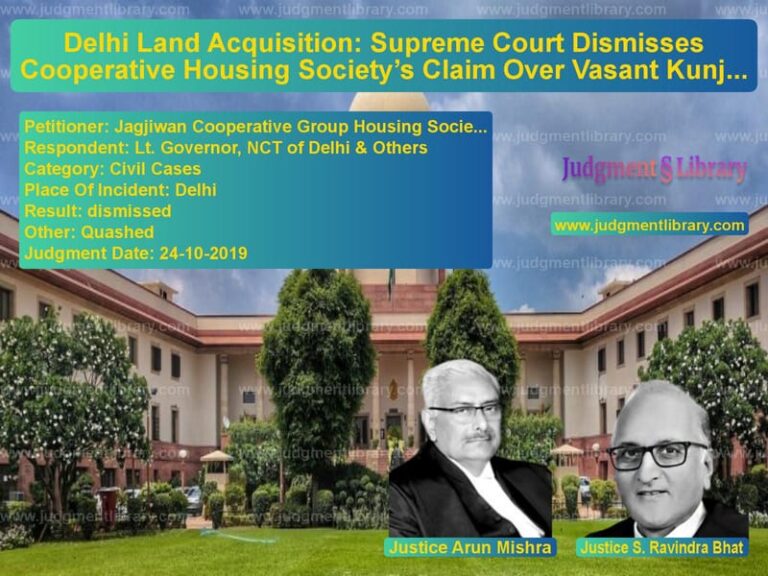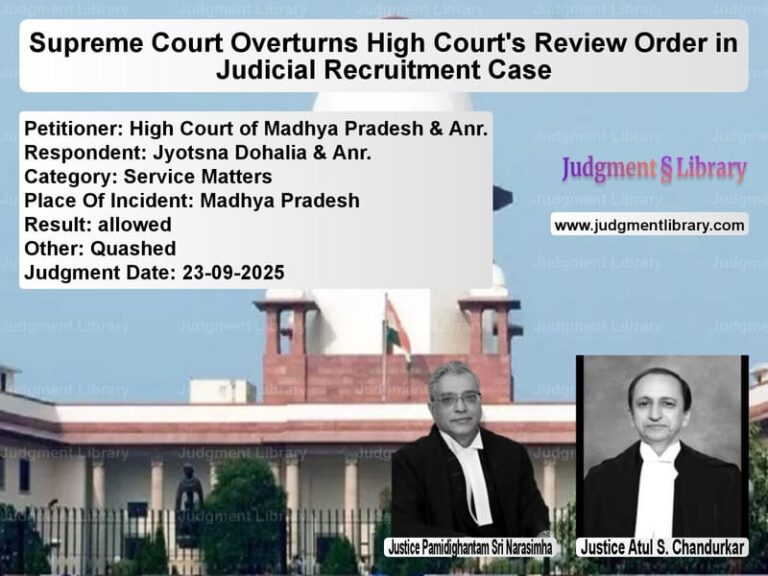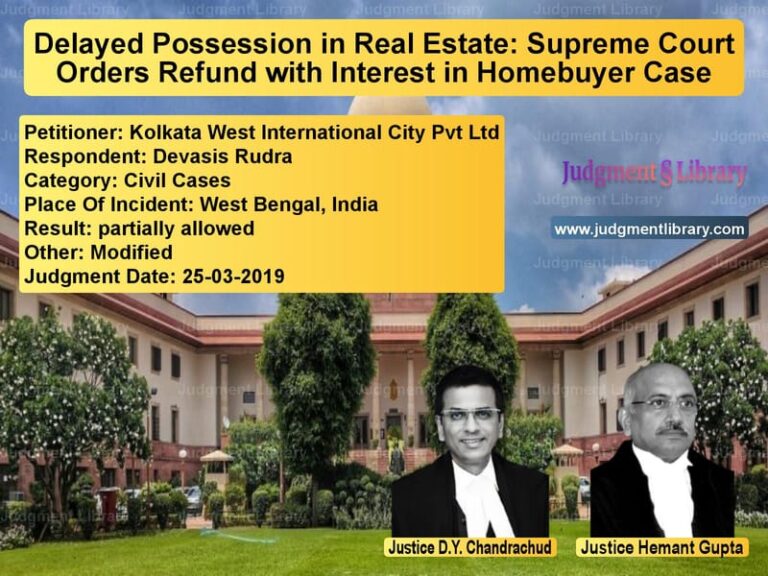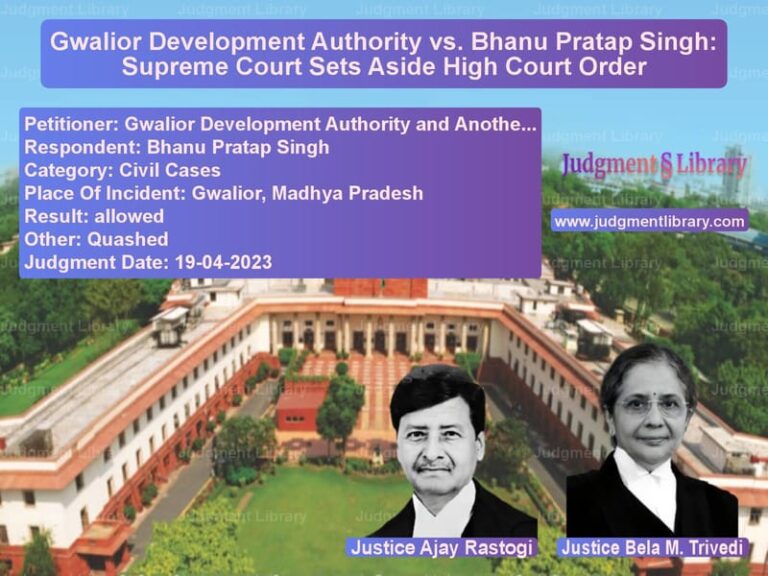Supreme Court Reinstates Jammu and Kashmir Drug Inspectors: Detailed Judgment Analysis
The Supreme Court of India delivered a significant judgment in Tajvir Singh Sodhi & Others v. The State of Jammu and Kashmir & Others, concerning the long-disputed selection process of drug inspectors in Jammu and Kashmir. The case was brought before the apex court after the Jammu and Kashmir High Court annulled the selection process, leading to prolonged litigation.
The Supreme Court ultimately ruled in favor of the petitioners, reinstating the selected candidates and setting aside the High Court’s decision. This judgment highlights the importance of procedural fairness in public sector recruitment and establishes guidelines for judicial intervention in selection processes.
Background of the Case
In 2008, the Jammu and Kashmir Subordinate Services Selection Board (JKSSB) issued Advertisement Notice No. 3 of 2008, inviting applications for various government posts, including 72 vacancies for drug inspectors. The selection process involved:
- Assessment of academic qualifications
- A viva-voce interview
- Final merit list preparation
The appointments were made in 2009, and selected candidates assumed their respective positions.
Challenges to the Selection Process
Unsuccessful candidates filed multiple writ petitions before the Jammu and Kashmir High Court, alleging irregularities in the selection process. The High Court found procedural lapses and ordered the cancellation of all appointments.
The selected candidates, having served in their positions for over a decade, challenged the High Court’s decision before the Supreme Court.
Arguments by the Parties
Petitioners (Selected Candidates)
- The selection process was conducted per the Jammu and Kashmir Subordinate Services Recruitment Rules, 1992.
- All selected candidates met the eligibility criteria, and their qualifications were duly verified.
- The alleged procedural lapses, such as missing individual award rolls, did not impact the fairness of the selection.
- They had served for over ten years without any complaints, making their removal unfair.
Respondents (Unsuccessful Candidates)
- The selection process lacked transparency and was marred by irregularities.
- The viva-voce marks were disproportionately high for some candidates, suggesting favoritism.
- Some candidates had degrees from unrecognized institutions.
- The High Court had rightly annulled the appointments due to procedural lapses.
Supreme Court’s Key Observations
Judicial Review in Selection Processes
The Court emphasized that judicial interference in recruitment should be limited:
“Courts should not act as appellate bodies over selection committees unless there is clear evidence of mala fide intent.”
Validity of Selection Criteria
The Court upheld the criteria used by the JKSSB, stating:
“Allocating higher weightage to advanced qualifications is reasonable and does not indicate bias.”
Impact of Missing Award Rolls
The Court ruled that the absence of individual award rolls was not a sufficient ground to cancel the entire selection process:
“The final select list was duly signed and approved by all board members. Procedural lapses that do not impact the selection’s fairness cannot be a basis for annulment.”
Final Judgment
- The Supreme Court set aside the High Court’s judgment.
- The appointments made in 2009 were reinstated.
- The petitioners were allowed to continue their service without interruption.
- The Court directed the JKSSB to take corrective measures in future selection processes.
Impact of the Judgment
- Prevents Unnecessary Disruptions: The ruling protects employees from arbitrary removal due to technical objections.
- Limits Judicial Overreach: The decision reinforces that courts should intervene only in cases of proven malpractice.
- Ensures Fairness in Recruitment: The ruling affirms that minor procedural lapses should not override a fair selection process.
Conclusion
The Supreme Court’s ruling in Tajvir Singh Sodhi & Others v. The State of Jammu and Kashmir & Others establishes a precedent for handling recruitment disputes in government services. By reinstating the selected candidates, the Court has ensured justice while upholding the integrity of public sector recruitment.
Petitioner Name: Tajvir Singh Sodhi & Others.Respondent Name: The State of Jammu and Kashmir & Others.Judgment By: Justice K.M. Joseph, Justice B.V. Nagarathna.Place Of Incident: Jammu and Kashmir.Judgment Date: 28-03-2023.
Don’t miss out on the full details! Download the complete judgment in PDF format below and gain valuable insights instantly!
Download Judgment: tajvir-singh-sodhi-&-vs-the-state-of-jammu-a-supreme-court-of-india-judgment-dated-28-03-2023.pdf
Directly Download Judgment: Directly download this Judgment
See all petitions in Employment Disputes
See all petitions in Recruitment Policies
See all petitions in Public Sector Employees
See all petitions in Legal Malpractice
See all petitions in Promotion Cases
See all petitions in Judgment by K.M. Joseph
See all petitions in Judgment by B.V. Nagarathna
See all petitions in allowed
See all petitions in supreme court of India judgments March 2023
See all petitions in 2023 judgments
See all posts in Service Matters Category
See all allowed petitions in Service Matters Category
See all Dismissed petitions in Service Matters Category
See all partially allowed petitions in Service Matters Category

